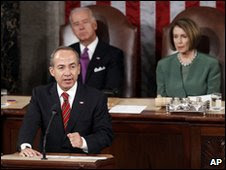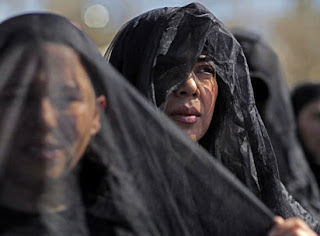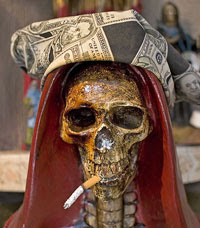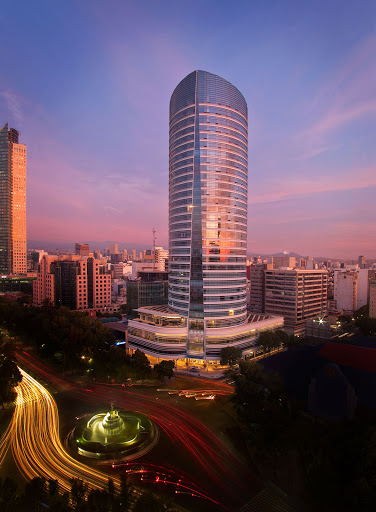Tuesday, May 25, 2010
Mexican judges learn U.S. justice system in L.A.
Monday, May 24, 2010
Mexico's Felipe Calderon vows to defeat violent gangs

In order to quell the Drug War, President Calderon called on the US to halt the flow of weapons across the border into Mexico. Calderon stated that increased violence between the drug cartels coincided with the "2004 lapse of a US assault weapons ban" while reminding Congress that "80% of recently seized guns could be traced to the US."
On the issue of immigration, Calderon admired Mexican migrant workers in the U.S. and promised to help secure their rights even though they are abroad. Felipe Calderon also voiced his regret that so many Mexicans leave the country to go north of the border and promised to create more economic opportunities within the country. Calderon also called on Congress to reform the US immigration policy. "The time has come to reduce the causes of migration and turn this into a legal, orderly and secure flow of workers and visitors," Calderon said. President Calderon then voiced his discontent with the recent Arizona immigration laws which he describes as "a terrible idea using racial profiling." President Obama had made immigration reform one of his top priorities, but with recent change over in the seats in Congress, analysts find it unlikely the legislation will hold any weight.
Sunday, May 23, 2010

This article from the Economist talks about President Calderon's visit to Washington D.C. and his meeting with President Obama. The article touches on the main topics concerning the two presidents, including the drug war, immigration, elections/politics and the violence that is causing the Mexican people to lose faith in Mr. Calderon and the government.
The meeting between President Obama and President Calderon was called by Obama to show "that the two neighbours have become friends" and to increase cooperation between the two countries. But, even tough Obama has shown his disagreement with the new Arizona law, there has still been an increase in tension between the United States and Mexico. "The governors of Mexico’s border states said they would boycott a routine meeting with their American counterparts in Phoenix." Meetings such as these have helped improve cooperation between American and Mexican official when dealing with drug traffickers, and some people are worried that the boycott of these meetings will have a negative effect on the communication that has recently been improving, "diplomats from both countries note that their daily collaboration has improved". Some of the cooperation between the countries includes "The Mérida initiative, a scheme under which the United States has offered Mexico modest anti-drug aid, has been extended and tweaked to emphasise strengthening institutions, such as the judiciary", the fact that Mexico is allowing the United States to have such a huge role in strengthening institutions shows how desperate Mexico has become for help and how much influence the United States has over Mexico.
The article also talks about domestic politics and how President Calderon is no longer being trusted by the Mexican people to fix the countries many problems, "polls suggest that Mexicans are becoming sceptical of Mr Calderón’s insistence that he is beating the drug gangs." The kidnapping of Mr. Fernendez de Cevallos also hurts the legitimacy of Mexico's government since he was such an influential (PAN) party member and well known in Mexican politics.
This article is important because it addresses the legitimacy of the Mexican government and the dependency of Mexico on the United States and the importance for the two countries to keep close relations.
Monday, May 17, 2010
This article from the L.A. Times is about Monterrey, Mexico and the drug war. Monterrey is one of Mexico's wealthiest cities and has two times the national GDP per capita. Some of Mexico's best schools are in the city and it is the economic center of the country. For some time it has been untouched by the violence and corruption that is plaguing the rest of the country, but just now has that violence been seeping into the country. The wealth and affluence has made Monterrey an easy place for criminals to launder money, and the authorities in the city have began to lose control. Many think that this increase in crime is because Monterrey has turned a blind eye to the drug crime that has been going on in the city. This has to do with transparency because a city's money as able to shield it from crime and corruption
Sunday, May 16, 2010
"'Signs of Violence' found as Ex-Candidate is Missing in Mexico"

This article from the New York Times addresses the apparent, but unconfirmed, kidnapping of Diego Fernendez de Cevallos; a former presidential candidate and important broker of Mexico's National Action Party. Diego Fernendez de Cevallos ran for president of Mexico in 1994, when the first televised national electoral debates occurred. Fernendez ran against the PRI while they were still in power, and even though he was not able to win the presidency, he stayed with his party and has been an influential leader of the National Action Party ever sense.
Diego Fernendez is 69, and his car was found near his ranch in central Queretaro. All of his belongings were still inside along with unspecified
(besides a "small pair of scissors with traces of blood on the ground near the car") "'signs of violence'". the former candidate has not been seen and his family says that they have not been contacted for "ransom" and the mystery behind the disapearence of Diego Fernendez de Cavallos continues.
This article is important to look at in Comparative Government because it has to do with the stability of the government. It is never good when an important political official goes missing, especially when the case involves violence, but during these unstable times in Mexico, the foul play suspected behind Diego Fernendez's disappearance leads to an even more devastating effect on the countries moral and beleif that the government can handle the violent situation in Mexico.
Monday, May 10, 2010
This relates to political and economic change because European nations cause a country's currency to rise in value.
Mexico Extradites Ex-Gov. To US on Drug Charges

Friday, May 7, 2010
Fears That a Lush Land May Lose a Foul Fertilizer

This is very important to look at in Comparative government because not only does this point out the development issue of Mexico formerly not treating it's sewage water, but it also poses as a public policy issue and an economic issue for the farmers.
Monday, March 29, 2010
Mexico Revives Ancient Games
Mexico and American Security Co-operation
This article is relevant to our class because it is a prime example of the unique relationship that exists between America and Mexico--a relationship that at times is uneasy but completely valid. As well, this article states that some of the aid money sent to Mexico from the US will go to judicial reform. Mexico's judicial system is most likely the weakest branch of government but with the recent reform, Mexico is solidifying itself more and more into a liberal democracy.
Sunday, March 28, 2010
Mexico's Oil Politics Keeps Riches Just Out Of Reach

Mexico has been one of the top oil exporting countries of the world, and there is a great pride found in the 1938 law removing any and all foreign investors (because of this, March 18 is a civic holiday). But now as Pemex, Mexico's top oil company, has found itself slowing production by immense amounts, people are starting to worry about the future of Mexico's oil industry. Canterell, Mexico's largest oil field, has dropped production by about 50% in the past years, and many people are afraid that Mexico, who takes in 30 to 40 percent of their national revenue from oil, will be forced to start importing oil in the next decade.
Many researchers believe that the oil is there, beneath the land and deep in the Gulf of Mexico, but Premex just doesn't have the technological necessities or the money to reach it. Extracting oil from deep beneath the ocean is costly and risky, most companies find partners to share the financial risk with. The problem is that the Mexican constitution does not allow foreign investors to take any profit from oil they help find so no foreign partners are given any incentive to help. One water rig from deep in the ocean can cost $365 million a year to operate, and without outside help, Mexico's oil industry is going to suffer even greater catastrophe.
President Calderon has made some reforms to help Pemex and the oil industry, but the nationalistic view that the people have of Mexico's 1938 law, and the wish to keep foreign business out has stalled much of Mexico's needed technological advancement. Pemex has long been "a symbol of nationalism and sovereignty", but with this lag in oil production, it might cause Mexico to go into an even worse economic recession.
This article is important to look at in Comparative Government because it refers to Mexico's national belief in the Dependency theory, that foreign business and investors need to be kept out so that local and state businesses can develop. This also poses as a huge economic problem for Mexico. If one of it's main sources of revenue goes under, than the following economic crash will cause major civic unrest and political upheaval. it will be important to see how this plays out, and how the government deals with the problems of the drug war, growing poor population, and weakening of legitimacy that would follow an even bigger economic panic.
Monday, March 8, 2010
Northern Mexcian Cops in Protest

Sunday, March 7, 2010
Los Nacrocorridos and the Drug War

The New York Times article, Minstrels in the Court of the Kingpin, talks about how narcocorridos, which are controversial songs, usually ballads, that glorify drug lords and drug violence, are affecting peoples outlook and how the government has responded to this type of music.
The article talks about Los Tucanes, a famous band in Mexico that has made many "unofficial" nacrocorridos that are tributes to Mr. Lopez, a high ranking member of the Tijuana drug cartel. These nacrocorridos have become more and more popular, especially in cities where drug violence is most prominent, and killings have become a daily part of life. George Castaneda, a former foreign secretary of Mexico says, “the corridos are attempts by Mexican society to come to terms with the world around them, and drug violence is a big part of that world."
But, these songs have been banned from the radio and, in January, "the country’s ruling party drew up a congressional proposal to issue prison sentences of up to three years to artists who glorify traffickers in songs or films." The government, and other supporters of reform, see these songs as detrimental to societies trying to fight the drug cartels because it normalizes violence and drugs and makes them feel like a more permanent part of life.
This issue brings to question Mexican citizens right to freedom of speech and how secure their Civil Rights are if ballads and movies can be banned from being shown and heard because of their content; and people can be jailed for things they say in movies and songs.
Sunday, February 28, 2010
Mexico bills allows privatization of oil
This article from chron.com Deals lag, as does Mexico's oil output deals with Mexico not being able to access most of its oil in the Gulf of Mexico because the company Pemex doesn't have the technology for exploration. A recently passed bill will allow Pemex to make deals with foreign companies for oil exploration. This is a big deal, because oil in Mexico was previously state operated. But so far, Pemex hasn't made any deals, so oil production has slumped.
Gay Marriage in Mexico

The article, Gay Marriage Puts Mexico City at Center of Debate, from the New York Times, talks about the gay rights movement in
This is a topic that has found its way into every country, and is important to look at when comparing the amount of civil rights given to a country’s people. This issue shows the ideological cleavage between the minority liberals in
Sunday, February 21, 2010
Mexican Military Offensive Against Drug Violence Ineffective
In the Time article How Mexico's Drug War May Become Its Iraq, Ioan Grillo describes Mexico's efforts to curtail drug violence throughout the country, and how its citizens do not have confidence in the military presence. Violence has only increased recently, with January being the bloodiest month in the drug war. The military has also been criticized for only targeting some drug cartels, which strengthens rival cartels. In a poll, half of Mexicans believed the government involvement had only increased the violence, while only 20% thought it had made the country safer. The United States has made agreements with Mexico to work together on security
Drug Wars Hinder Juarez Economy

New Plan for Ciudad Juarez

The article A "dying" city protests from The Economist this past week talks about Mexico's war on drugs and what actions the president has taken to improve the situation.
On February 11th president Felipe Calderon went to the crime infested Ciudad Juarez for a public safety meeting. Ciudad Juarez is Mexico's 5th largest city and is " the world's deadliest city outside a war zone." Mr. Calderon did not get a very warm welcome in Juarez because of the continued rate of violence in the city after three years of the president saying he was combating the drug gangs, and because of the lack of efficiency of the troops sent to stop the violence and murders. The president visited the city again on the 17th seeking to "make amends" for calling the 18 teenagers who were recently murdered at a party "gangsters". This second visit is important because, "although polls showed initial skepticism towards his plan and his visit, on his second trip his talks with community groups suggested broad agreement on the new strategy."
The President's new "emergency plan" calls for an increase of police along with social and economic reforms which are necessary to diminish the power of the drug gangs in the community. These reforms include "investment in health, education, child care and sports facilities." The recession has left many people out of work and out of school, they don't have many alternatives to joining the gangs which is a major problem the president is trying to face in his new plan. New schools, more hospitals, more parks and more cultural facilities need to be built to help Ciudad Juarez grow away from the drug gangs.
Ciudad Juarez's police has been seen as corrupt, and police lines were recently tapped, giving the drug gangs dangerous information. Also, the troops that were sent to the city are not liked by the citizens because of the many illegal searches and overall lack of good they have done. Hopefully much of this will change after these new plans are put in place and real reform will be seen in Ciudad Juarez.
This article is important for Comparativists to look at because it shows public policy in Mexico and it will be important to see how these policies are enacted and how effective they are. This is also important because of the large impact this war on drugs has on the lives of people living in Mexico, and these new reforms could mean a more prominent and active civil society in Ciudad Juarez and Northern Mexico.
Sunday, February 7, 2010
Housing US prisoners in Mexico jails
BBC News article: Schwarzenegger proposes Mexican jails take US inmates
Drug War Obscures Recent Headway in Mexico's Stability
A Mexican Cult

The Economist article, A Mexican Cult: Death in holy orders is about the cult of Holy Death that has been rising in popularity throughout Mexico. Santa Muerte (Saint Death) is not actually considered a Saint by the Church, but "some 2m Mexicans are said to worship [her]." Santa Muerte is depicted as a skeleton holding a scythe and a globe, and wearing a hood and tunic. She is believed to be the protector of both the law-abiders and criminals, so she is popular in many jails, and she is also often shown smoking a joint and accepts offerings of tequila and beer.
Bishop's in Mexico have deemed this cult as satanic, and the government has withdrawn official recognition from churches that recognize and incorporate Santa Muerte. This, and the fact that the government has destroyed about 30 altars devoted to Santa Muerte on the grounds that they were suspected in drug trafficking, has made many followers angry and rallies were held in Mexico City demanding religious freedom.
This article is interesting to look at in Comparative Politics, because it brings up the question of Legitimacy. If the people think that the government is taking away their freedom of religion than that will raise questions as to how democratic Mexico is, and people will wonder how real their Civil Rights actually are.
Sunday, January 31, 2010
Mexico Economy Rides on Drugs

From Spas to Banks, Mexico Economy Rides on Drugs
Mexico City Gay Marriage Law
Internal safety of Mexico: the Drug Violence



Gun attack at Mexico student party leaves 13 dead
This article from BBC News talks about a shooting at a high school party in Ciudad Juarez, Mexico. The attack is assumed to be drug related because Ciudad Juarez is next to a main drug smuggling route into the United States; though there is no immediate connection between the party and the drug cartels. According to witnesses, four SUVs drove up to the house and about fifteen people with guns stormed the party shooting mercilessly into the crowd of kids. The dead are between 15 and 20 years old. Eleven children died and two adults died, many more were injured.
The government has sent 45,000 troops and extra police to fight the violence that has fumed all across the country. The murders and attacks have become daily occurrences in many regions of Mexico, and though the troops and officials have lessened some of the violence, there are still large amounts of attacks and killings that make life, economic and political stability hard to hold onto in Mexico.
For Comparative Government, these attacks and murders are important to look at in discussing Sovereignty, Authority and Power in Mexico and in looking at Citizens Society and the State. The shooting at this high school party in Ciudad Juarez, and all of the shootings and violence that have occurred, have effected the quality of life in Mexico, and the feeling of security among it's citizens. This hurts the civil society because it makes people feel unsafe and less like a community. It also effects the legitimacy of the government, because it's people do not feel like the government is acting effectively to protect them, and in many cases citizens know of or believe there to be corruption in the police and in the government. This war on drugs is very important to look at in Comparative Government for all of these social and political reasons.
Sunday, January 24, 2010
Mexico President Race
Mexican president incumbent, Felipe Calderon, has been plagued by a brutal drug war since he took office in 2006 and no one from his conservative National Action Party appeals as a strong successor for the looming 2012 elections. However, Pena Nieto of the Industrial Revolutionary Party and Ebrard, of the Democratic Revolution Party, stand as ambitious presidential hopefuls.
Both of these hailed playboys rely on eccentric and flamboyant attempts to gain media attention (like appearing on TV with soap opera stars) but this seems to be the only commonality that these politicians share. Left wing Ebrard is sympathetic to unions, a defender of abortion rights, and champions higher taxes for welfare reform; while Right sided Nieto in contrast has sent police forces to bust up union protests, has supported abortion bans, and believes infrastructure is the key to social welfare reform. These juxtaposing politicians, if elected, seem to have ambitious plans for Mexico.
This article is pertinent to the concepts of Comparative Government as it shows Mexico slowly casting aside its stigma as an illiberal democracy. Ruled for 71 years by the single party policies of the IRP, Mexico now looks like a more solidified democracy as it allows the people more than a single party to be fairly voted into office. As well, this article shows how the media puts more emphasis on what sells the papers versus important political information--this NY Times article spent as much time addressing the presidential hopefuls' policies as it did their controversial private life and love affairs.
 The next Antonio Banderas? Nope, this is the suave presidential hopeful Pena Nieto
The next Antonio Banderas? Nope, this is the suave presidential hopeful Pena Nieto (Photo courtesy of Flickr.com)
Friday, January 22, 2010
Recession in Mexico

A Different Type of Recession is an article from the Economist, it talks about how the global recession has affected Mexico and what this will mean for Mexico’s future.
Mexico's market economy is still heavily under development. Mexico has both a developing industrial market in the north, and a largely agricultural economy in the south. Globalization has helped Mexico industrialize and grow. NAFTA, the North American free trade agreement, shows how globalization has connected Mexico economically with the United States.
This recent recession is taking longer for Mexico to overcome than the crash Mexico saw in 1995. This time the United States can’t help bail Mexico out and Mexico’s industries are suffering. Mexico City and other major cities in Mexico have not been affected as badly as the smaller manufacturing and industrial cities have. Because the United States' consumption of goods from northern Mexico's industrial plants has slowed down so much, the manufacturing cities and labor jobs have been hit hard. NAFTA has made Mexico dependent on the United States, the manufacturing plants and investments by the U.S. has become a crutch for Mexico that has suddenly become too short.
But the daily life of businesses and people in the hustle and bustle of major cities has been relatively unaffected because of the lack of inflation. Government subsidies also saved many workers from becoming unemployed and some people are able to dip into their retirement funds and savings accounts. Of course this does not mean that everyone living and working in the major cities have not seen tragedy. The poorer sections of major cities have seen much poverty, families have to sell property and farm animals to pay for food to eat.
The agricultural economy in Southern Mexico, the poorest part of the country has not seen much change during this recession. The farmers are still able to farm, and didn’t have too many economic ties with the industrial cities who are crashing the most. Thankfully, the regular agricultural exports are still running as usual.
Swine Flu also affected the economy, making the crash that much harder to bear. The lack of tourists to pump money into the coastal cities, and the shut down of Mexico City for a week weakened the economy enough for the global recession to hurt that much more. Mexico’s oil industry is buckling under as well. The government used to not have to tax heavily because of the inflow of money from oil profits, but now, higher taxes are going to have to be placed on the already stressed incomes of Mexicans.


